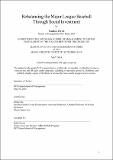Rebalancing the Major League Baseball Through Social Investment
Author(s)
Perrin, Matthieu
DownloadThesis PDF (4.269Mb)
Advisor
Chu, Johan
Terms of use
Metadata
Show full item recordAbstract
This thesis critically examines the enduring economic disparities within Major League Baseball (MLB) that threaten its competitive balance and the sustainability of its operations. Through an extensive data-driven analysis, this research identifies the foundational causes of the current imbalances that disproportionately favor financially robust teams and disadvantage smaller market franchises. The study leverages advanced financial metrics to cluster MLB teams and employs system dynamics modeling to simulate the impacts of existing and novel rebalancing mechanisms. The comprehensive analysis begins by detailing the financial landscape of MLB, highlighting the disparities in revenue streams between teams and their consequences on competitive balance. Using a clustering approach, teams are categorized based on key financial indicators, revealing distinct economic profiles that correlate strongly with on-field success and market presence. This categorization provides a clearer understanding of the disparities contributing to competitive imbalance. Subsequently, the research employs system dynamics to model the interactions between these financial variables and team performance over time. This model serves as a tool for testing various rebalancing strategies, including refined versions of revenue sharing and luxury taxes, which are currently employed by the league but need to address the root causes of imbalance adequately. The simulations suggest that while these mechanisms have some impact, they must be more robust when applied in their current forms. To address these shortcomings, the thesis proposes innovative strategies to redistribute 2 financial resources and talent across the league more effectively. These include adjustments to the formulas used for revenue sharing, introducing a more progressive luxury tax system, and implementing minimum spend requirements to prevent underinvestment in team competitiveness. Ultimately, this research argues for a holistic approach to reforming MLB’s economic structures, aiming to ensure a fairer competitive environment and enhancing the league’s viability for the future. By ensuring that all teams, regardless of their financial capabilities, have a genuine opportunity to compete for championships, these proposed measures aim to level the playing field and maintain the integrity and excitement of the league, fostering sustained fan engagement and growth.
Date issued
2024-05Department
Sloan School of ManagementPublisher
Massachusetts Institute of Technology